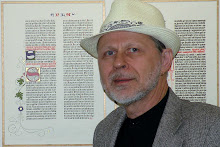05 March 2009
Probably some spoilers here if you are planning to read "The Testament" run along now.
First let me say I'm enjoying the read because I like a thriller and van Lustbader knows how to write them. His book, "The Testament," has a lot of similarities to the concept I've been describing in my posts this year about "Gutenberg's Other Book." An ancient book, scroll, or fragment, is of high interest because it could give some person or persons unlimited power of some sort. So, as I read it, I am trying to carefully pick out the differences and similarities. It's pretty easy to get caught up in the story and ignore what gets you involved.
Von Lustbader knows how to write a thriller. We have the element of starting off with a secret message and having the one person who knows everything killed. From there on, we have a constant chase with a fight, a death, a near-death, another death, or a crisis in every chapter as the hero is drawn deeper and deeper into the plot, against his will.
Second, there is the hero and his partner. Both are highly skilled and trained for rugged survival and for breaking codes and ciphers. It helps that Bravo, like Robert Langdon in "The DaVinci Code," has an eidetic memory and never has to write anything down. So, we have a hero who is initiated into a religious sect. He has highly honed physical combat and survival skills, can break any cipher or code, and remembers everything. His partner is a woman with which there is a strong sexual magnetism. She is already a member of the sect, trained even more in combat than he is because she is his guardian. She is strong and competent while at the same time exhibiting uncertainty and emotional fragility. Both have potentially damaging secrets in their pasts.
Next, there is the element of time. The hero has to find the secret cache and protect it before the bad guys find it and use it for evil. Triggered by an impending death of the pope. The bad guys know that only the hero can find the cache in time, so they manipulate him to ever greater speed. This ignores the concept that they would be better off not looking for the cache so they wouldn't lead the enemy to it.
So, mapping out the basics we have
More in Part 2.
First let me say I'm enjoying the read because I like a thriller and van Lustbader knows how to write them. His book, "The Testament," has a lot of similarities to the concept I've been describing in my posts this year about "Gutenberg's Other Book." An ancient book, scroll, or fragment, is of high interest because it could give some person or persons unlimited power of some sort. So, as I read it, I am trying to carefully pick out the differences and similarities. It's pretty easy to get caught up in the story and ignore what gets you involved.
Von Lustbader knows how to write a thriller. We have the element of starting off with a secret message and having the one person who knows everything killed. From there on, we have a constant chase with a fight, a death, a near-death, another death, or a crisis in every chapter as the hero is drawn deeper and deeper into the plot, against his will.
Second, there is the hero and his partner. Both are highly skilled and trained for rugged survival and for breaking codes and ciphers. It helps that Bravo, like Robert Langdon in "The DaVinci Code," has an eidetic memory and never has to write anything down. So, we have a hero who is initiated into a religious sect. He has highly honed physical combat and survival skills, can break any cipher or code, and remembers everything. His partner is a woman with which there is a strong sexual magnetism. She is already a member of the sect, trained even more in combat than he is because she is his guardian. She is strong and competent while at the same time exhibiting uncertainty and emotional fragility. Both have potentially damaging secrets in their pasts.
Next, there is the element of time. The hero has to find the secret cache and protect it before the bad guys find it and use it for evil. Triggered by an impending death of the pope. The bad guys know that only the hero can find the cache in time, so they manipulate him to ever greater speed. This ignores the concept that they would be better off not looking for the cache so they wouldn't lead the enemy to it.
So, mapping out the basics we have
| Observatines | Knights | Vatican |
| Bravo & Jenny | Jordan & Camille | Cardinal/Pope |
| Male & Female dichotomy | Knights/Church split | Deathbed |
| A traitor in their midst | Independence movement | Threat to doctrine |
| A murdered father & other dead guys | Lots of dead guys | |
| Manipulating the world for good with information | Wanting world domination & immortality |
Subscribe to:
Post Comments (Atom)

0 comments:
Post a Comment